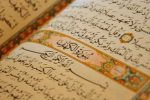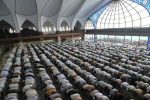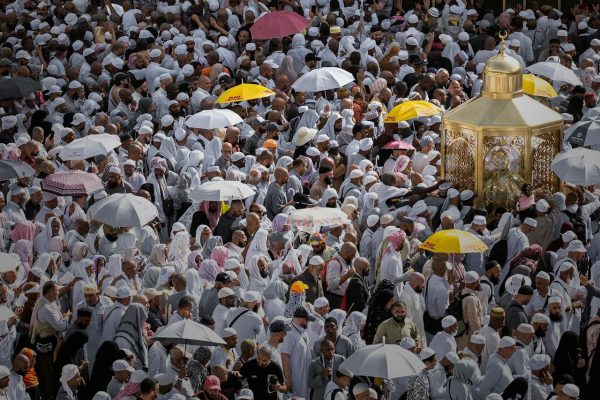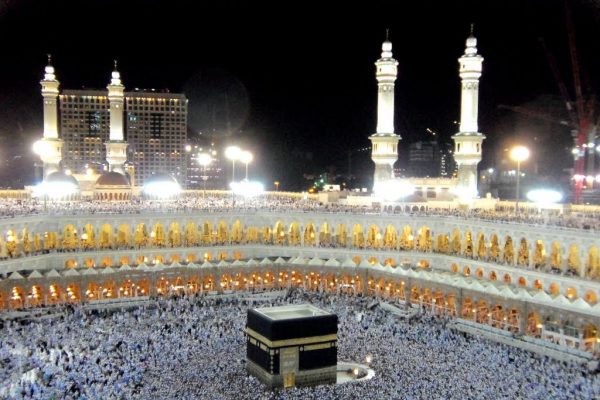The blessed days of Dhū ‘l-Ḥijjah
بسم الله الرحمن الرحیم
As we draw towards the end of Dhū ‘l-Qaʿdah, we approach the blessed month of Dhū ‘l-Ḥijjah. Within the next few days, we will enter what is considered by many scholars to be the most blessed days of the year; such that they even supersede the final ten days of Ramaḍān (although the nights of Ramaḍān are more virtuous). These are such days that Allah has even taken an oath on them in Sūrah al Fajr. Allah says: ‘And by the dawn. And by ten nights.’ According to the majority of exegetes, these ten nights spoken of are the ten nights of Dhū ‘l-Ḥijjah.[1]
Along with the virtue understood by the oath in the Qurʾān, the Messenger of Allah ﷺ has also elaborated on the virtue of these days. In a famous ḥadīth recorded by Bukhārī and others, Ibn ʿAbbās relates that the Messenger of Allah ﷺ said: ‘There are no days in which a righteous deed is more beloved to Allah than these ten days.’ The companions asked: ‘Not even fighting in the way of Allah?’ The Messenger of Allah ﷺ replied: ‘Not even fighting in the way of Allah – besides a person who leaves with his soul and his wealth and then does not return.’[2]
In view of the virtue of such days, the following four acts are recommended.
- Fasting during the first nine days.
The above quoted ḥadīth informs us that these days should be used for the worship of Allah. Fasting is one such act of worship which does not end after a few moments; rather, a person remains fasting throughout the day and therefore, he will be in worship throughout the day. Some narrations have been transmitted relating the virtue of fasting on these days. However, the chains of transmission (other than those regarding the fasting of the 9th of Dhū ‘l-Ḥijjah) are commented on. In a narration of Tirmidhī, the Messenger of Allah ﷺ is reported to have said that each fast of these ten days is equal to fasting a whole year. Likewise, Imām Nasāʾī has related from Hafsah, the Mother of the Believers, that the Messenger of Allah ﷺ would fast the nine days of Dhū ‘l-ḤĪjjah.[3]
As for the 9th of Dhū ‘l-Ḥijjah, which is the day of ʿArafah, all of the scholars are unanimous that fasting on this day is strongly encouraged. This is based on the authentic ḥadīth recorded in Muslim from Abū Qatādah that the Messenger of Allah ﷺ said: ‘Fasting on the day of ʿArafah expiates the sins of the past year as well as the following year.’[4]
For the above mentioned ḥadīths, fasts should be kept on the first nine days of this blessed month. If that is not possible, then whichever of the days can be fasted should be fasted. If not, then at the very least the fast of the 9th of Dhū ‘l-Ḥijjah should not be missed.
- Engage in dhikr
Along with fasting, the constant dhikr of Allah has also been encouraged. Imām Ṭabrānī and others have related from Ibn ʿAbbās that the Messenger of Allah ﷺ said: ‘There are no days greater, nor actions (carried out on any days) more beloved to Allah on any day, than the ten days. Thus, recite سُبْحَانَ الله، لَا إله إلّا الله، ألْحَمْدُ لِله، ألله أكبر (subḥānallāh, lā ilāha illallāh, alḥamdulillāh, Allāhu akbar) excessively.’[5]
- Standing in prayer during the night.
In a narration from Abū Hurayrah recorded by Tirmidhī, the Messenger of Allah ﷺ is reported to have said that standing in prayer during the first nine nights of Dhū ‘l-Ḥijjah is equal to standing in prayer in the laylat al qadr.[6]
- Slaughtering an animal (Uḍḥīyyah)
Slaughtering an animal for personal consumption and for charity is one of the greatest acts of worship on the 10th of Dhū ‘l-Ḥijjah.
Imām Tirmidhī has related from ʿĀʾisha that the Messenger of Allah ﷺ said: ‘The son of Ādam does not do any action on the day of slaughtering (10th of Dhū ‘l-Ḥijjah) more beloved to Allah than the spilling of blood [of a sacrificial animal].’[7]
Likewise, Imām Aḥmad has related from Zayd ibn Arqam that the companions asked the Messenger of Allah ﷺ: ‘What reward is there for us in them (the sacrificial animals)?’ The Messenger of Allah ﷺ replied: ‘In lieu of every strand of hair there is a reward.’ The companions then asked: ‘What about the wool?’ The Messenger of Allah ﷺ replied: ‘In lieu of every strand of wool there is a reward.’
Similarly, Imām Ḥākim has related from Abū Saʿīd Khudrī that the Messenger of Allah ﷺ said to his beloved daughter Fāṭimah: ‘O Fāṭimah, rise to your sacrificial animal and witness its slaughtering. For indeed, by the first drop of its blood which falls, all of your previous sins will be forgiven.’ She asked: ‘O Messenger of Allah, is this for our household specifically or for all Muslims?’ He replied: ‘It is for us and for all Muslims.’[8]
The above four rituals/acts of worship are those which have been transmitted in the narrations. Apart from the aforementioned, an attempt should be made to use these days wisely, just as is done during the days of Ramaḍān, thereby attracting the mercy and happiness of Allah. Hence, other forms of worship such as recitation of the Qurʾān and giving in charity are also advised.
Lastly, it is also imperative that the sanctity of these days is remembered and hence, abstinence from sin becomes even more important.
Ibrāhīm ibn Muḥammad
19/07/20
[1] قال ابن جرير: قوله: (وليال عشر) اختلف أهل التأويل في هذه الليالي العشر أي ليال هي فقال بعضهم: هي ليالي عشر ذي الحجة… والصواب من القول في ذلك عندنا: أنها عشر الأضحى لإجماع الحجة من أهل التأويل عليه، وأن عبد الله بن أبي زياد القطواني حدثني قال: ثني زيد بن حباب قال أخبرني عياش بن عقبة، قال ثني جبير بن نعيم عن أبي الزبير عن جابر أن رسول الله ﷺ قال: وَالْفَجْرِ وَلَيَالٍ عَشْرٍ قال: عشر الأضحى (24/397)
وقال ابن كثير: والصحيح القول الأول؛ قال الإمام أحمد:حدثنا زيد بن الحباب، حدثنا عياش بن عقبة، حدثني خير بن نعيم، عن أبي الزبير، عن جابر، عن النبي ﷺ قال: إن العشر عشر الأضحى، والوتر يوم عرفة، والشفع يوم النحر.
ورواه النسائي عن محمد بن رافع وعبدة بن عبد الله، كل منهما عن زيد بن الحباب، به ورواه ابن جرير وابن أبي حاتم، من حديث زيد بن الحباب، به وهذا إسناد رجاله لا بأس بهم، وعندي أن المتن في رفعه نكارة، والله أعلم
[2] روى البخاري عن ابن عباس رضي الله عنهما قال: قال رسول الله ﷺ ما من أيام العمل الصالح فيهن أحب إلى الله من هذه الأيام العشرة قالوا: يا رسول الله، ولا الجهاد في سبيل الله؟ قال: ولا الجهاد في سبيل الله، إلا رجل خرج بنفسه وماله فلم يرجع من ذلك بشيء
[3] روى الترمذي عن أبي هريرة رضي الله عنه قال: قال رسول الله ﷺ ما من أيام أحب إلى الله أن يتعبد له فيها من عشر ذي الحجة، يعدل صيام كل يوم منها بصيام سنة، وقيام كل ليلة فيها بقيام ليلة القدر. وقال الترمذي: إسناده ضعيف.
وروى النسائي عن حفصة رضي الله عنها قالت: أربع لم يكن يدعهن النبي ﷺ صيام عاشوراء والعشر، وثلاثة أيام من كل شهر، وركعتان قبل الفجر.
وروى أبو داود عن هنيدة بن خالد عن امرأته عن بعض أزواج النبي ﷺ قالت: كان رسول الله ﷺ يصوم تسع ذي الحجة، ويوم عاشوراء، وثلاثة أيام من كل شهر، أول اثنين من الشهر والخميس.
وروى أبو عوانة في مستخرجه عن أبي هريرة رضي الله عنه عن النبي ﷺ قال: ما من أيام الدنيا أيام أحب إلى الله أن يتعبد له فيها من أيام العشر، وإن صيام يوم منها ليعد بصيام سنة وليلة منها بليلة القدر.
[4] روى مسلم عن أبي قتادة رضي الله عنه قال قال رسول الله ﷺ: صيام يوم عرفة أحتسب على الله أن يكفر السنة التي قبله والسنة التي بعده
[5] روى الطبراني في الكبير عن ابن عباس رضي الله عنهما قال قال رسول الله ﷺ: ما من أيام أعظم عند الله، ولا أحب إلى الله العمل فيهن من أيام العشر فأكثروا فيهن من التسبيح، والتهليل، والتحميد، والتكبير. قال الهيثمي: رجاله رجال الصحيح.
[6] عن أبي هريرة، عن النبي ﷺ قال: ما من أيام أحب إلى الله أن يتعبد له فيها من عشر ذي الحجة، يعدل صيام كل يوم منها بصيام سنة، وقيام كل ليلة منها بقيام ليلة القدر. قال الترمذي: هذا حديث غريب لا نعرفه إلا من حديث مسعود بن واصل، عن النهاس، وسألت محمدا، عن هذا الحديث فلم يعرفه من غير هذا الوجه مثل هذا وقد روي عن قتادة، عن سعيد بن المسيب، عن النبي ﷺ مرسلا شيء من هذا وقد تكلم يحيى بن سعيد في نهاس بن قهم من قبل حفظه
[7] روى الترمذي وعن عائشة رضي الله عنها قالت: قال رسول الله ﷺ: ما عمل ابن آدم من عمل يوم النحر أحب إلى الله من إهراق الدم، وإنه ليؤتى يوم القيامة، بقرونها وأشعارها وأظلافها، وإن الدم ليقع من الله بمكان قبل أن يقع بالأرض، فطيبوا بها نفسا
[8] عن أبي سعيد الخدري رضي الله عنه قال: قال رسول الله ﷺ لفاطمة عليها الصلاة والسلام: قومي إلى أضحيتك فاشهديها فإن لك بأول قطرة تقطر من دمها يغفر لك ما سلف من ذنوبك» قالت: يا رسول الله، هذا لنا أهل البيت خاصة أو لنا وللمسلمين عامة؟ قال: بل لنا وللمسلمين عامة





